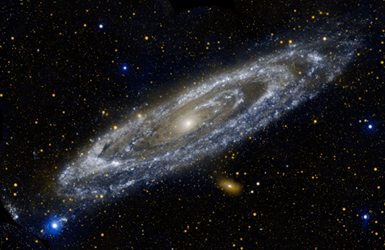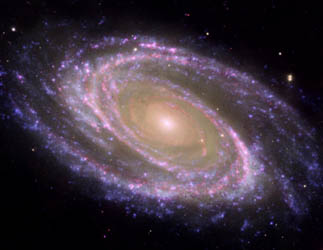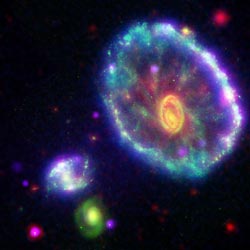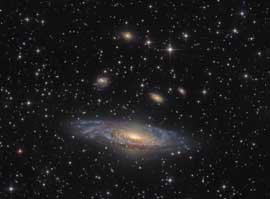Why cosmology?
BrainsNet.Net considers cosmology and genetics the two
fields where scientific knowledge is the most lacking, advancing the fastest,
and the most significant to an understanding of ourselves.
So these two subjects are given a place in BrainsNet.Net.



Dark Matter and Dark Energy
Real or Imagined?
The position of BrainsNet.Net is that there are no such things as dark energy or dark matter. In seeking to explain the expansion of the universe or what holds a galaxy together and the way stars orbit around the centre of galaxies cosmologists have made a number of assumptions. In fact, they have been forced to create invention upon invention to explain a number of observations which conflict with their theories. The Standard Model will have to be discarded. [See also Einstein's Biggest Blunder, under ...Human Wisdom.]
Galaxies rotate as if their stars were, more or less, fixed on a piece of fabric - the speed of the outer stars is similar to those near the centre. This is very different to how planets revolve round stars - the closer to the star, the faster. In other words, a solar system does not rotate as a whole like a galaxy does. And it is this paradox that dark matter has been invented to explain, by presuming a lot more mass than is visible, and therefore a lot more gravity. One or two other observations seem to support this.
It is interesting that dark energy and dark matter have been invented in order to explain phenomena opposite of each other, one to explain what pushes things apart (the apparent expansion of the universe) the other what holds things together. Trying to explain everything on the basis of gravity is pushing us back to Newtonian times, before Einstein, when we should be ahead.
Consider the many things our spacecraft have discovered within our solar system, our very own back yard, which surprised us and made no sense at all in terms of our local 'experience' (Einstein's choice of word) on planet earth. From Pluto to Jupiter and various planetary moons, places we can almost touch and certainly measure and photograph close up, have left us struggling for explanations. If such near objects discredit our assumptions, trying to explain the greater universe should be approached with very different minds.
A similar mystery is why our own sun is perfectly spherical even though it spins so fast. At over 4000 mph, it should be bulging at the equator like Jupiter does. Something else is in operation. This was only discovered in 2012, so clearly there is a lot we do not know.
Going back to galaxies, it may be that we do not fully understand how
the laws of physics operate on such a vast scale, or that some other law
operates, as yet undiscovered on our tiny planet. For example, it is possible
that something operates at galactic level equivalent to the strong and
weak nuclear forces at atomic level.
 More
likely, the answer lies in understanding space itself. The fabric of space
is not at all understood. Space is not empty. Quite apart from matter,
light, particles etc., the fabric of space itself is real. BrainsNet.Net
believes this is where our study should be concentrated, on the nature
of the fabric of space, although it may be that the fabric of space will
be as difficult ever to understand as the workings of the human brain.
More
likely, the answer lies in understanding space itself. The fabric of space
is not at all understood. Space is not empty. Quite apart from matter,
light, particles etc., the fabric of space itself is real. BrainsNet.Net
believes this is where our study should be concentrated, on the nature
of the fabric of space, although it may be that the fabric of space will
be as difficult ever to understand as the workings of the human brain.
One remembers the 19th century belief in the existence of ether to explain how light travelled through space, and later complex experiments to detect this ether - a similar search to our dark matter detectors now. But there was no ether; they just had not understood the nature of light.
I doubt also whether the universe is still expanding at present. It may
be stable overall. Light reaching us from billions of years ago does not
tell us what is the state of such distant parts of the universe at now
earth time. Again, our understanding may depend on the nature of space
and its fabric. It is possible that space expands and contracts simultaneously
at different parts of the universe, either through gravity or some other
force, or both.
Editor
May 2014
 Update:
As if to support the above position now, in January 2018,
we are finding "pretty serious" discrepancies in the expansion
rate of the universe, depending on how it is calculated. So yet another
invention is being suggested, to add to dark matter and dark energy: a
new particle, the sterile neutrino. If the Standard Model
were a car, it would have been scrapped some time ago, as beyond further
repairs.
Update:
As if to support the above position now, in January 2018,
we are finding "pretty serious" discrepancies in the expansion
rate of the universe, depending on how it is calculated. So yet another
invention is being suggested, to add to dark matter and dark energy: a
new particle, the sterile neutrino. If the Standard Model
were a car, it would have been scrapped some time ago, as beyond further
repairs.
It is in the nature of science that knowledge advances by putting forward new theories while the old are discarded. However, I believe a different language is needed when dealing with such cosmic problems, a language which admits ignorance far more readily. This is because, unlike other scientific areas, what we know as proven about the cosmos is infinitesimally small, compared to how much there is to know, whereas cosmologists speak as if there are only gaps in our understanding.
What difference would that make? Perhaps a new language will open minds to new approaches, as opposed to constant adjustments and affirmations of something that does not work. We need a new Einstein for such thinking, who may not even be a cosmologist.
Minds that can grasp detailed complexity are very different from those who can shrink vast concepts to the size of an orange at their fingertips. What we need is the latter. I believe that the answer will not come from maths, but will be confirmed mathematically after it has been imagined in the abstract - what Einstein called thought experiments.
Watch this space - no pun intended.
Editor
January 2018
This page will be updated from time to time.
Come back soon for more.
January 2014: Stephen Hawking changes his understanding of black holes.

